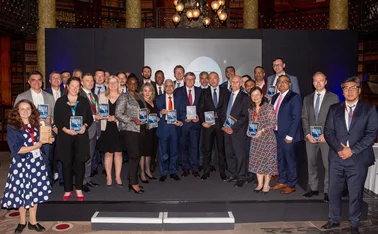
FinTech Policy of the Year: South African Reserve Bank

The rapid pace of fintech development and integration has forced regulators and supervisors to be more proactive in assessing its risks and opportunities.
In March 2020, South Africa became one of the first countries to unite its five financial supervisors and regulators with a single fintech agenda. The Intergovernmental Fintech Working Group (IFWG), whose members include the South African Reserve Bank (Sarb), has launched the Innovation Hub – the focal point for future fintech developments for the sector.
“This is not just ‘innovation theatre’ or a desire to project a different image of supervisors and regulators in the market but is, in fact, critical to our continued ability to successfully execute our mandates,” says Arif Ismail, divisional head for oversight of the Sarb’s National Payment System Department.
According to Ismail, the IFWG is the first entity globally to extend such an offering. The body was formed in 2016; its initial mission was to understand the role of fintech within South Africa’s financial sector and adapt the regulatory landscape.
Since then, the IFWG has provided guidance on cryptoassets and managed the central bank’s distributed ledger project looking at updating interbank payment networks. However, the IFWG’s latest project is arguably its most ambitious – the new Innovation Hub consists of a Regulatory Guidance Unit, Regulatory Sandbox and Innovation Accelerator.
The Regulatory Guidance Unit acts as a central point of entry for market players looking to resolve specific questions regarding the policy landscape and regulatory requirements. “The unit will provide comprehensive responses integrating the positions of all IFWG supervisors/regulators,” says Ismail, not just those of the central banks.
“With increasing convergence in the financial sector, basing policy decisions, technology investments and other positions on one organisational perspective is no longer appropriate,” Ismail says. “Collaboration enables us to reach positions that take into consideration the diverse needs and risks identified across the regulatory landscape and financial sector holistically.” While the guidance is non-binding, it does eliminate the need for firms to contact multiple regulators.
The sandbox provides the market with an environment to test new products or services within parameters established by the IFWG. Firms report on testing progress regularly. “Learnings from the testing will help regulators determine if and how policies must change to promote responsible application of fintech,” Ismail says.
The Innovation Accelerator acts as an add-on to the sandbox and provides an environment for IFWG members to learn from and collaborate – including with the broader financial sector ecosystem – on emerging innovations in the industry. While experiments have focused on new technology, the IFWG has also engaged in different forms of communication, including live Q&As on YouTube, a ‘Hub Talks’ podcast and video tutorials breaking down regulatory topics. The accelerator has also hosted impact-oriented fintech workshops and hackathons.
Only users who have a paid subscription or are part of a corporate subscription are able to print or copy content.
To access these options, along with all other subscription benefits, please contact info@centralbanking.com or view our subscription options here: http://subscriptions.centralbanking.com/subscribe
You are currently unable to print this content. Please contact info@centralbanking.com to find out more.
You are currently unable to copy this content. Please contact info@centralbanking.com to find out more.
Copyright Infopro Digital Limited. All rights reserved.
You may share this content using our article tools. Printing this content is for the sole use of the Authorised User (named subscriber), as outlined in our terms and conditions - https://www.infopro-insight.com/terms-conditions/insight-subscriptions/
If you would like to purchase additional rights please email info@centralbanking.com
Copyright Infopro Digital Limited. All rights reserved.
You may share this content using our article tools. Copying this content is for the sole use of the Authorised User (named subscriber), as outlined in our terms and conditions - https://www.infopro-insight.com/terms-conditions/insight-subscriptions/
If you would like to purchase additional rights please email info@centralbanking.com
Most read
- Supervisors grapple with the smaller bank dilemma
- ECB says iPhone is currently incompatible with digital euro
- Central bank of the year: Central Bank of Brazil







